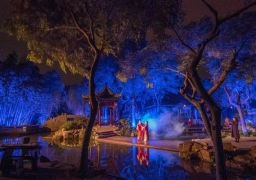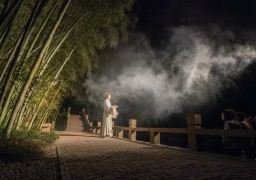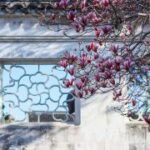The performance of ‘The Peony Pavilion’ is a story that resonates with everyone’s past, present, and future lives. The fated love affairs of the mortal world are locked away in a dusty treasure chest for centuries. Six hundred years later, how does one unlock the past? Beyond the city of Shanghai, in the twilight, a visit to the garden brings the dream of spring back to life! Guided by a green lamp, the pine pavilion tests the spring water. Listening to the sounds of nature, one understands the elegance and intent. The audience and performers, amidst the flowing cups along the winding stream, return to the mysteries of the universe. From this moment, a piece of drama is etched, commemorating one’s own emotions: The path of three lives on the Peony Pavilion, originally a person from the dream of spring chambers. The ancestor of Chinese live garden Kunqu Opera ‘Live Garden Kunqu Opera The Peony Pavilion’, since its debut at the 2010 Shanghai Expo in June, has been performed for 12 years and 272 times in Zhujiajiao’s Ke Zhi Garden. The performance has received a cumulative audience of 60,000 people from all over the country and the world. The play is directed by musician Tan Dun as the artistic director, and co-produced by Tan Dun and Kunqu artist Zhang Jun, presenting the masterpiece of the Ming Dynasty literary giant Tang Xianzu ‘The Peony Pavilion’. This is China’s first live garden Kunqu Opera. The work presents the lifestyle at the peak of Kunqu Opera, creating a classical atmosphere of literati and scholars enjoying the opera on a moonlit night, and restoring the life of ancient Chinese guests enjoying music in the clear rhymes of the wealthy and powerful. Act One: In the Garden, Du Liniang and her maid Chunxiang enter the back garden for a leisurely stroll. She is captivated by the spring scenery and takes a rest in her dream, where she tenderly interacts with Liu Mengmei, only to wake up feeling lost. Act Two: The Departed Soul, from then on, Du Liniang’s longing turns into illness, leading to severe illness and death. On her deathbed, she instructs her maid Chunxiang to bury her under the plum tree in the back garden and bury her portrait under the Taihu stone. Act Three: The Mysterious Tryst, three years later, Liu Mengmei goes to the capital for the imperial examination and stays overnight at the Meihua Temple. He finds Du Liniang’s portrait, deeply infatuated, calling out to her repeatedly. Du Liniang hears his voice and, as a ghost, visits the back garden to share the pillow with Liu Mengmei. Act Four: Resurrection, their deep love moves heaven and earth, with the help of Aunt Shi, Du Liniang is brought back to life and they finally become a married couple. Open all year round from 20:30 to 21:45, for specific performance times, please refer to the product details, subject to the actual situation of the scenic area.








